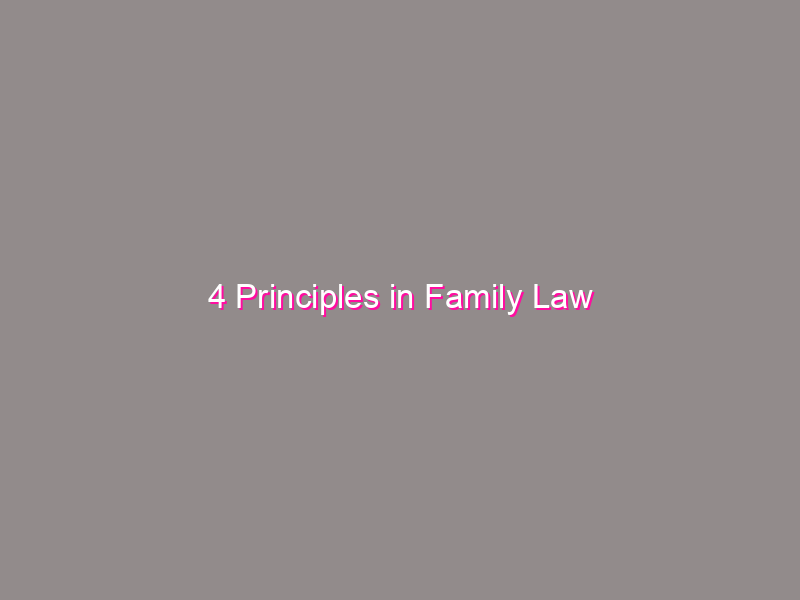

Likewise in Indonesia, until now there are still many unresolved legal problems. Legal problems in Indonesia are not only related to law enforcement, but sometimes to legal products themselves. The fundamental aim of law is to improve order, legal certainty and justice in society so that people, regardless of class, feel protected and have their rights protected.
In a family, we definitely want a harmonious relationship between family members and in ensuring the creation of family harmony this must also be accompanied by good parenting patterns from parents and how they give rules but without limiting the child’s movement space.
Family law is part of individual law, while family law is defined as a set of regulations regarding kinship and kinship due to marriage (marriage, parental care, guardianship, guardianship, absence).
And in a family relationship, of course, it also involves the role of family law which tries to regulate relationships between families in order to get guarantees of a good life from their families.
Because even though everyone wants family relationships to be harmonious and happy, in reality it is not uncommon for there to be several conflicts related to their own family members, so it requires the role of family law to resolve these conflicts.
For this reason, all Grameds friends understand better the meaning of family law which is regulated according to civil law in Indonesia. In this discussion, we have summarized various information related to family law which can be used as a source of knowledge for all Grameds friends.
You can see further discussions related to family law below!
Understanding Family Law
The term family law comes from the translation Familierecht (Dutch) or family law (English). Family law, as discovered by Ali Afandi, is defined as a set of provisions relating to kinship and marital relations (marriage, parental responsibility, guardianship, guardianship, absence).
According to Ali Afandi, there are two important things regulated by family law in relation to blood relations and marriage. Kinship is a relationship that exists between several people who have the same lineage. Meanwhile, kinship is a family bond that results from a marriage between a person and a blood relative and his wife (husband).
Tahir Mahmud defines family law as legal principles that are explained on the basis of religious observance, relating to matters that are often believed to have a religious dimension, according to family regulations, marriage, divorce, family relationships, household responsibilities, inheritance, dowry, guardianship and etc.
Tahir Mahmud’s definition essentially considers two aspects, namely legal principles and legal scope. Although the scope of family law research includes family regulations, household responsibilities, inheritance, dowry, guardianship and others. If you are concerned, this definition is too broad because it includes inheritance, which is part of property law in BW civil law.
This definition covers at least two important aspects, namely legal rules and legal content (coverage). Legal rules include written family law and unwritten family law. Written family law is the legal basis that comes from statutes, contracts and case law.
Unwritten Family Law is the principles of family law that arise, grow and develop in community life. For example, in Mamari Sasak City. Knowledge of family law includes marriage, divorce, marital property, lineage, guardianship and guardianship. From the definition above, it can be concluded that family law is basically the entire legal system, both written and unwritten, which regulates legal relationships arising from family ties, which include:
-
- Marriage orders with all marital matters
- Divorce Terms
- Parental authority rules
- Adjusting the child’s position
- Realization of Regulations (Guardian) and
- Guardianship Rules (voogdij).
Western civil law contains the principle that family law with its various provisions is essentially closely related to public order. Thus, any action that violates this provision is null and void by law.
The concept of Indonesian civil law states that Western civil law (BW) is no longer considered as law that applies without conditions. There are several considerations behind this regulation, including:
-
- There is a tendency for BW to lean towards liberalism, so it must be abandoned and channeled into the realm of Indonesian socialism.
- The Supreme Court decided that the provisions were temporarily invalid because they were no longer in accordance with changing times and were discriminatory.
- Making the identity of the Indonesian nation plural, so that it is far different from western natural conditions. For example, with the enactment of Islamic law and customary law.
Understanding Family Law According to Experts
Another view on the importance of family law is as follows:
1. Van Apeldoorn
“Family law is the regulation of legal relations arising from family relationships”.
2. CST Kansil
“Family law consists of a set of legal provisions resulting from the unity of family life.”
3. R. Subekti
“Family law is the law that regulates legal relations arising from family relationships.”
4. Rahmad Usman
“Family law is a provision that regulates relationships between different individuals within family ties.”
5. Djaja S. Meliala
“Family law is the general rule that regulates the legal relationship between blood relatives and families resulting from marriage.”
6. Sudarsono
“Family law is the totality of regulations that regulate legal relationships between blood relatives and relatives by marriage.”
If we look at the opinions of the experts above regarding the importance of family law, according to them there are two important things, namely blood relations and marriage.
Hereditary family ties are referred to as consanguineous families, meaning relatives who share the same ancestor. Some of these blood relatives are drawn along the paternal line, known as matrilineal, and some along the maternal and paternal lines, known as parental or bilateral.
Family ties that are born from marriage are called semenda families, namely relatives born from marriage consisting of the husband’s relatives and the wife’s relatives. In contrast, family ties created through custom are called traditional families, meaning they arise from conventional ties, such as adopted siblings.
Principles in Family Law
Based on analysis referring to the Civil Code and Law Number 1 of 1974, the marriage provisions contain several principles that apply in family law, namely as follows:
- The principle of monogamy means that a man can only have one wife and vice versa. (Article 27 of the Civil Code and Article 3 of Law No. 1 of 1974).
- The principle of agreement, namely the principle according to which a marriage or guardianship is valid if there is an agreement or arrangement between the prospective husband and the prospective wife that establishes the marriage or family (Article 28 of the Civil Code and Article 1 of Law 6). 1974)
- The principle of proportionality, the principle of balance between the rights and position of the wife and the rights and position of the man in domestic life and society. (Article 31 Law Number 1 of 1974)
- The principle of integerity, the principle by which husband and wife combine their assets (Article 119 of the Civil Code)
Family Law Resources
Basically, family law sources can be divided into two types, namely written sources of family law and unwritten sources of civil law. Unwritten sources of family law are legal norms that grow and develop and are adhered to by the majority of communities or ethnic groups living in Indonesia. Meanwhile, sources of written family law come from various statutory regulations, jurisprudence and contracts (agreements).
Sources of written family law in Indonesia include:
- Civil Law (Burgerlijk Wetboek);
- Mixed Marriage Law (Mogelijk op de Gemengde Huwelijk), Stb. 1898-158;
- Javanese, Minahasa and Ambonese Christian Indonesian Marriage Order (Huwelijke Ordonnantie Christen Indonesiers), Stb. 1933-74;
- Law Number 32 of 1954 concerning Registration of Marriage, Divorce and Harmony (Muslims according to Religion);
- Marriage Law no. 1 of 1974;
- Government Decree no. 9 of 1975 Implementing Regulations of the 1974 Marriage Law;
- There is already Government Decree Number 10 of 1983, Government Decree Number 45 of 1990 concerning Marriage and Divorce Certificates for Civil Servants;